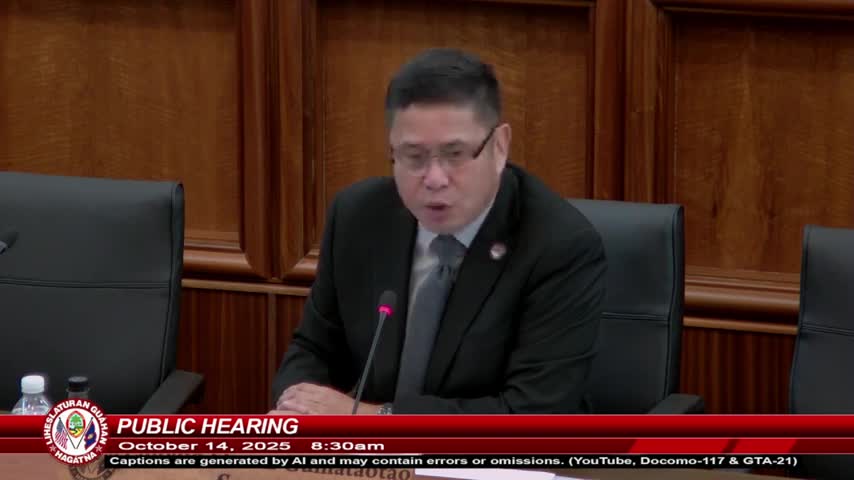Guam hearing probes bill to require classified grants and fusion‑center leadership after OPA audit
Get AI-powered insights, summaries, and transcripts
Subscribe
Summary
Guam legislators heard competing testimony Oct. 14 on Bill 184‑38 COR, a measure that would require classified civil‑service positions for key homeland‑security posts and mandate automatic submission of federal performance and financial reports to the Legislature and the Office of Public Accountability.
Guam legislators heard competing testimony Oct. 14 on Bill 184‑38 COR, a measure by the chair of the Committee on Public Safety, Emergency Management and the Guam National Guard that would (1) require classified positions for the Office of Homeland Security (OHS) grants manager and the Marianas Regional Fusion Center (MRFC) director and (2) require OHS to submit federally required project performance, compliance and financial reports to the Guam Legislature and the Office of Public Accountability (OPA) whenever they are filed with a federal awarding agency.
The measure was introduced during a public hearing called by Senator Sean Gumatao, chair and author of the bill. Gumatao framed the proposal as a response to findings in a 2024 OPA investigative audit that linked federal noncompliance and repeat findings to leadership instability and weak grants management, and said the bill “supports the immediate and long term operational requirements of OHS” and would help “salvage whatever credibility Guam still has in the eyes, minds, and hearts of federal awarding agencies.”
Supporters and opponents differed sharply over whether mandatory classified status is the right fix. Benjamin J.F. Cruz (BJ Cruz), Guam’s Public Auditor, said the OPA had documented long‑running problems and that “something has to be done.” Cruz told the committee the issues predated recent administrations and urged legislative action, noting prior transition reports and the scale of fiscal exposure referenced by auditors.
Opponents argued the bill would create operational and staffing problems without addressing root causes. Esther Agege, Guam Homeland Security advisor at the Office of Homeland Security, testified in opposition and said mandating classified positions “will not resolve the underlying issues identified in the Office of Public Accountability report” and could hinder recruitment and retention because federal employers and military partners can offer higher compensation or may be unable to occupy classified local civil‑service posts. Agege described the programmatic problems as leadership instability, insufficient qualified personnel, and gaps in internal financial controls and performance measures; she noted Guam had lost about $8.4 million in federal reimbursements cited in testimony and OPA reporting.
Lucia Perez, a special projects coordinator at OHS who works on ESF‑2 telecommunications and cybersecurity, also urged the Legislature not to pass the bill, saying its provisions duplicate existing law (citing Article 14.1 of Title 5, Guam Code Annotated and 4 GCA §4103) and risk “flowing operational readiness” by imposing rigid classification and blanket report duplication that could slow staff during emergencies. Perez recommended performance‑based reforms, periodic briefings to committees, and use of existing civil‑service authority to classify positions when federal funding justifies them.
Rudy Gaza, director of the Marianas Regional Fusion Center, likewise opposed mandatory classified status for the MRFC director. Gaza told senators that much fusion‑center work is unclassified or “sensitive, but not strictly secret,” that the MRFC relies on federal partners and task‑force arrangements, and that requiring classified civil‑service appointment could create costly removal procedures if a security clearance is later denied.
Committee members pressed OHS witnesses on operational details. Gaza said the MRFC had nine personnel (including himself) and eight analysts, of whom two currently hold security clearances; he said a national backlog can delay new clearances for six months to a year. Perez said the combined OHS/OCD staffing totals 12 employees, of whom five are in classified service; she described steps taken under a corrective action plan, including desk reviews with grantors, personnel timekeeping improvements, training with FEMA, and efforts to clear fiscal years up to FY2021.
Senators noted the Office of Public Accountability’s finding of approximately $8.4 million in lost federal reimbursements and sought specifics on drawdowns. OHS representatives said recent drawdowns were much smaller — they cited figures of about $39,000 and $200,000 for specific reimbursements — and that work to document and justify past expenses is ongoing with federal grantors.
Witnesses also described organizational reforms underway to reduce single‑person control of grant functions: Perez said the office has increased redundancy, assigned multiple roles (authorizing official, financial analyst, grants reviewer) across staff, and created corrective‑action items including standard operating procedures and sign‑in records to support reimbursements and auditing.
The Bureau of Budget and Management Research (BBMR) provided a fiscal note waiver indicating the bill is administrative and would not fiscally impact FY2025 appropriations; BBMR’s waiver was dated Sept. 23, 2025.
Senators expressed concern about separation‑of‑powers and operational agility but also about long‑running noncompliance and the practical effects on Guam’s ability to receive federal homeland‑security funding. At the close of the hearing Senator Gumatao reiterated that the bill responds to OPA findings and regional homeland‑security stakeholders and said he would work with colleagues and stakeholders on amendments. No vote was taken; the committee recessed and scheduled additional hearings and a markup process.
Ending: The joint public hearing recessed at 10:07 a.m. Oct. 14; the measure will proceed to further committee work and potential amendments before any final legislative action.
